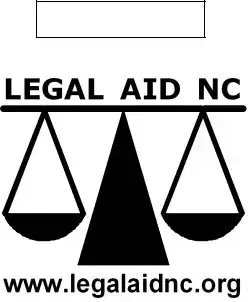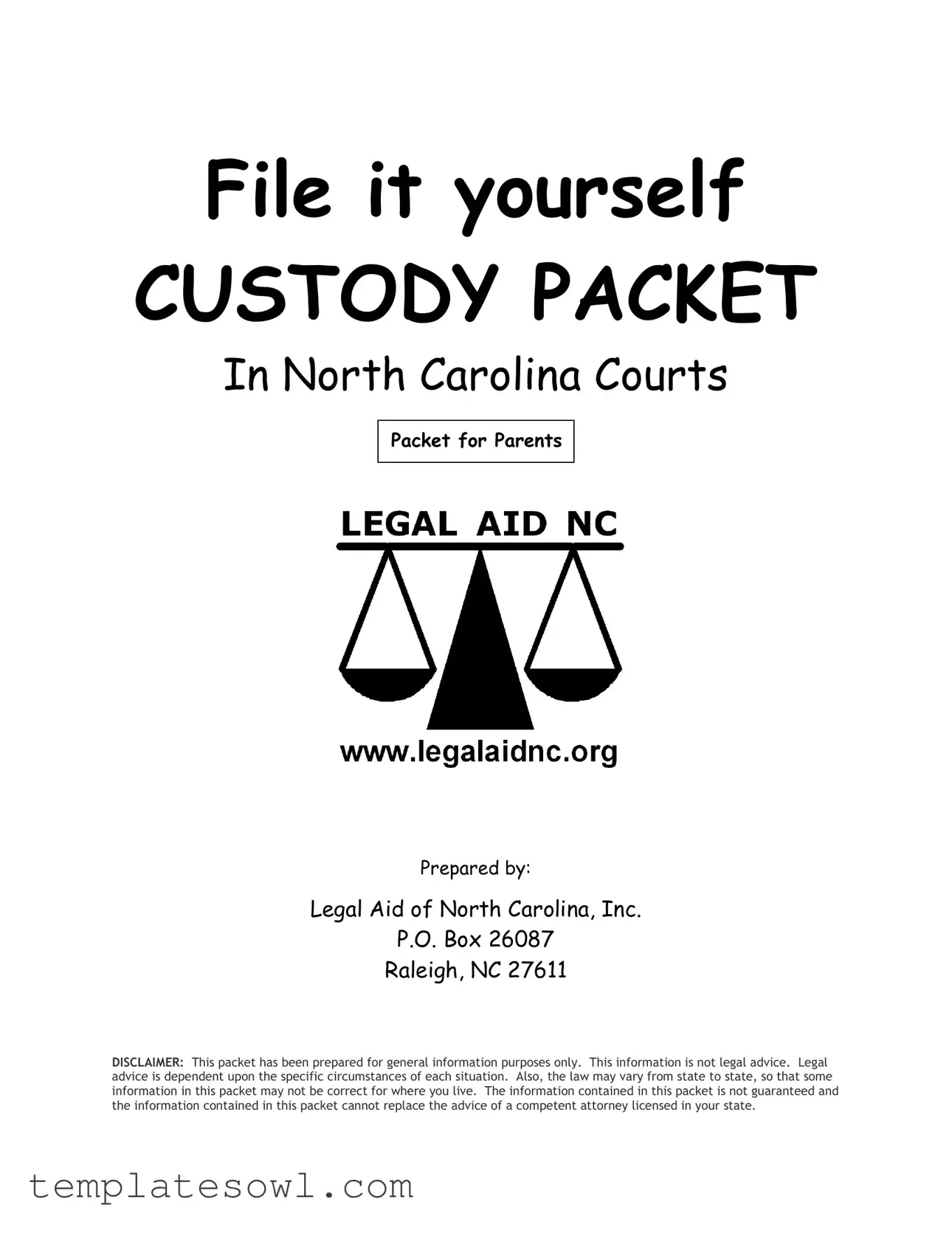Fill Out Your Nc Custody Form
The North Carolina Custody Form is a critical document for parents seeking to establish legal custody arrangements for their children. This form encompasses several essential aspects, such as determining physical custody, legal custody, and visitation rights. It is designed to outline the specific responsibilities and rights of each parent to ensure the child's best interests are prioritized. Parents must complete sections related to their income, living arrangements, and any previous legal custody orders. The form also prompts parents to detail their proposed parenting plan, addressing school choices, medical decisions, and other key considerations. Additionally, this form plays a vital role in the court's decision-making process, as it provides a structured format for presenting information clearly. Understanding the requirements and implications of the North Carolina Custody Form is crucial for parents navigating this often emotional and complex process.
Nc Custody Example

!"#$ % $!&&

!"#$ % #
$##
!#&
'((!)*%
(*%
'((*%
'+(((*%
*%
'(.).*%
)
())(
/&0#!!0 &102 !
'!
() *
+,
.,
345
6) |
) |
||
|
|
||
4 674
4 9(:)
4 ,=.)
4 8
.(?.
)+.)@
.(..)@
'+.(7(.
'+.@)A)@
7)
.+)@7
'.)9:9:
"(!0)*1
';<;<.)@)?=;
7<(9
:'((..
'+)(.?;B+B<
)())@)?
;B)B<
"()*1
'.9:
+)(.?;B+B< '.?.).
.'))(
)..'
.)).
?+)(B)
B
)?)()(
((.
9?:
(C0)@.@
>
"(21*
94:).()
.,+.)(
BB')(
()
@(.(
.)(4
)(.@.@(
(D(?
"(*1
'9:
D.).
)
"()*1
'9,:;<')
('.)
.)
2
)C+)
F)
&))1
.C@(
5
()(..
8).(C
).
(
)@..(
)'
9):)
)?
)))?@.(
'.((
8).(
D.(.(
!
•5+,
>94:
•+,
))(
•65567#)0+,
))(
$
+50/,
#

STATE OF NORTH CAROLINA |
|
In the General Court of Justice |
County of _______________________ |
|
District Court Division |
|
|
File _________________________ |
|
) |
|
________________________________ |
) |
|
Name of Plaintiff |
) |
|
|
) |
|
v. |
) |
COMPLAINT FOR CUSTODY |
|
) |
VISITATION |
|
) |
[COMP CUST/VIST] |
|
) |
|
________________________________ |
) |
|
Name of Defendant |
) |
|
NOW COMES THE PLAINTIFF, complaining of the Defendant, and alleges and says:
1. The Plaintiff is a resident and citizen of ___________________ County, in the State of North Carolina
.
2.The Defendant is a resident and citizen of _________________ County, in the State of ___________________.
3.The parties (check one)
are married but living separate and apart. are divorced.
have never been married.
4.The parties are the parents of the following child[ren]: ______________________________________________
___________________________________________________________________________________________
5.FIRST CHILD. During the past five (5) years the minor child, ____________________________________, born on _______________________ has lived as follows:
Period Of Residence
|
Dates |
From |
To |
Address
Name of Person
Lived With
Present Address Of Person
Present
1

(Check ONLY those that apply)
I have participated in litigation concerning the custody of the above named child.
Name of Court |
Case Number |
Date of Decision |
___________________________ |
___________________________ |
___________________________ |
I have information of a lawsuit concerning the above named child in a court in North Carolina or another state.
Name of Court |
Case Number |
Nature of Proceeding |
___________________________ |
___________________________ |
___________________________ |

 I know of a person as listed below, who has Rights with respect to the above named child.
I know of a person as listed below, who has Rights with respect to the above named child.
Physical Custody
Claimed Custody
Claimed Visitation
Name and Address of Person(s)
_____________________________________________________________________________________
_____________________________________________________________________________________
(Use only if another child. Use additional pages as necessary.)
SECOND CHILD. During the past five (5) years the minor child, _________________________________, born
on _______________________ has lived as follows:
Period Of Residence
|
Dates |
From |
To |
Address
Name of
Person Lived
With
Present Address Of Person
Present
2
Form Characteristics
| Fact Name | Description |
|---|---|
| Purpose | The North Carolina custody form is used to establish legal custody agreements for children. It helps parents detail their rights and responsibilities regarding child care and decision-making. |
| Governing Law | North Carolina General Statutes, specifically Chapter 50, govern custody arrangements. This body of law outlines the legal standards used in making custody decisions. |
| Form Accessibility | The custody form is accessible online through the North Carolina Judicial Branch website, making it easy for parents to obtain and fill out the necessary documentation. |
| Filing Process | Completed forms must be filed with the Clerk of Superior Court in the appropriate county. This step initiates legal proceedings regarding custody. |
| Modification | Custody arrangements can be modified over time. If circumstances change, parents may need to complete a new form to reflect updates in their living situations or responsibilities. |
Guidelines on Utilizing Nc Custody
Filling out the NC Custody form requires attention to detail and accuracy. After completing the form, you will submit it to the appropriate court that handles custody cases in your county. Make sure you have all the necessary information on hand, as this will streamline the process.
- Begin by entering your name and contact information at the top of the form.
- Provide the name and contact information of the other parent or guardian.
- Fill in the child’s name and date of birth in the designated section.
- Specify your relationship to the child in the appropriate field.
- Indicate the type of custody you are seeking (e.g., sole custody, joint custody) by checking the relevant box.
- Detail your parenting plan, including living arrangements, visitation rights, and any other pertinent information.
- List any existing custody agreements or court orders related to the child.
- Sign and date the form at the bottom before proceeding to submission.
What You Should Know About This Form
What is the NC Custody Form?
The NC Custody Form is a legal document used in North Carolina for determining custody arrangements for children. This form addresses various aspects of custody, including physical custody and legal custody, specifying which parent or guardian will make significant decisions regarding the child's upbringing and where the child will primarily reside.
Who should complete the NC Custody Form?
The NC Custody Form should be completed by individuals involved in custody disputes, such as parents, guardians, or other parties seeking custody of a child. It is essential to ensure that both parties are in agreement on custody matters or to seek the court's intervention when necessary.
How can I obtain the NC Custody Form?
What information is required on the NC Custody Form?
The NC Custody Form requires detailed information, including the names and addresses of both parents or guardians, the child's name and date of birth, and the proposed custody plan. In addition, it may ask for background details related to the child's living situation, educational needs, and any prior custody arrangements.
Do I need an attorney to fill out the NC Custody Form?
While it is not mandatory to have an attorney to fill out the NC Custody Form, legal advice is highly recommended. An attorney can ensure that all aspects of custody are properly addressed and that your rights are protected, especially if custodial disputes arise.
What happens after I submit the NC Custody Form?
After submitting the NC Custody Form, the court will review the application. A court date may be set for a hearing, where each party can present their case regarding custody. The judge will then make a decision based on the best interests of the child.
Can the custody arrangement be modified after the form is submitted?
Yes, custody arrangements can be modified even after the form has been submitted and a court order has been issued. Changes in circumstances, such as relocation or changes in job status, may warrant a reassessment of the custody agreement. A new form may need to be filed to initiate these modifications.
Is there a filing fee for the NC Custody Form?
Yes, there is typically a filing fee associated with submitting the NC Custody Form to the court. Fees may vary by county, so it is advisable to check with the local courthouse for specific amounts. Fee waivers may be available for those who qualify based on financial need.
Common mistakes
Completing the North Carolina custody form can seem straightforward, but common mistakes can complicate the process. Understanding these pitfalls can help avoid unnecessary delays or issues.
One of the most frequent errors is incomplete information. Individuals often leave sections blank or fail to provide required details. Each section must be filled out completely to ensure that the court has all the necessary information to make a proper determination regarding custody.
Another issue arises from illegible handwriting. If the form is handwritten, unclear writing can lead to misunderstandings or misinterpretations. It is best to use printed letters to maintain clarity throughout the document.
Some people neglect to double-check their calculations. When filling out financial disclosures related to custody arrangements, accuracy is crucial. Errors in income or expenses can mislead the court about the financial needs of the child.
An often overlooked mistake is failing to include the correct parties. In some cases, individuals mistakenly list only one parent’s information without including other necessary parties, such as guardians or caretakers. This omission can delay the custody process.
Additionally, individuals sometimes use outdated forms. Courts periodically update legal documents and procedures. Ensuring that the most current version of the custody form is being used can help prevent rejections based on technicalities.
Failing to provide supporting documents is another common oversight. Many aspects of custody arrangements must be supported by documentation, such as proof of residence or evidence of parental involvement. Missing these can lead to gaps in your case.
Some applicants also forget to sign and date the form. A form lacking a signature and date is considered incomplete and cannot be processed by the court. Therefore, taking a moment to ensure the form is properly signed can save time and trouble.
Misunderstandings about court hearing procedures can also create issues. Individuals often fill out the form without understanding how their information fits into the broader legal context. Familiarity with the process can lead to a more accurate submission.
Lastly, many people fail to keep copies of submitted forms. Having a copy for personal records is essential, as it allows for easy reference in future hearings or negotiations. Always remember to retain proof of what has been submitted.
Documents used along the form
The North Carolina Custody Form is a key document in family law cases regarding child custody. It is often utilized alongside several other forms and documents to provide comprehensive information and facilitate the legal process. Below is a list of four commonly associated documents.
- Child Support Guidelines Worksheet: This form is used to calculate the appropriate amount of child support one parent may owe the other. It considers factors such as income, healthcare, and other necessary expenses.
- Affidavit of Parental Alienation: This document allows a parent to assert concerns regarding the other parent's behavior, which may be detrimental to the child's welfare. It serves as evidence in custody hearings.
- Parenting Plan: A detailed outline of how parents will raise their child together post-separation. This plan covers aspects like visitation schedules, decision-making authority, and communication practices.
- Motion for Temporary Custody: This legal request is filed when a parent needs a court to establish temporary custody arrangements while the permanent custody order is being determined.
These documents work together with the North Carolina Custody Form to ensure that all relevant information is presented to the court, aiding in a fair resolution of custody issues. Understanding these forms can make the custody process smoother and more effective for all parties involved.
Similar forms
The North Carolina Custody form shares similarities with several other legal documents often used in family law cases. Here is a list of those documents:
- Child Support Worksheet: Like the custody form, this document outlines financial responsibilities for the care and support of a child. Both forms require detailed information about the parents' financial situations and children's needs.
- Visitation Schedule: This document specifies the parenting time allocated to each parent. Similar to the custody form, it aims to maintain the best interests of the child while detailing who is responsible for the child during certain periods.
- Parenting Plan: This comprehensive document addresses various aspects of child care. It is drafted with the same intent as the custody form—to ensure the child’s well-being by outlining both parents' responsibilities and rights.
- Modification Petition: When changes are needed regarding custody arrangements, this document is filed. The urgency is akin to that of a custody form, as it seeks immediate adjustments based on evolving family circumstances.
- Affidavit of Parentage: This form establishes legal parenthood, which directly influences custody decisions. It serves the same foundational purpose as the custody form in determining parental rights and responsibilities.
- Guardianship Petition: Similar in context, this document establishes a legal relationship between an adult and a child. Both the guardianship petition and custody form center on a child’s best interests and their need for care.
- Family Law Mediation Agreement: This document is essential for resolving disputes amicably. It resembles the custody form as both aim to foster agreement between parents for the sake of their children.
Dos and Don'ts
When preparing to fill out the North Carolina Custody form, attention to detail is essential. The process can feel overwhelming, but following some clear dos and don’ts will help ease your experience.
- Do read all instructions carefully. Understanding the requirements will guide you in completing the form correctly.
- Do provide accurate information. Ensure that all names, dates, and other details are correct to avoid complications later on.
- Do keep copies of your completed form. Retaining a copy will serve as a reference in case questions arise in the future.
- Do ask for help if needed. If any section is unclear, don’t hesitate to reach out for assistance.
- Don't rush through the form. Take your time to avoid mistakes that could delay your process.
- Don't leave questions unanswered. Providing complete information is crucial.
- Don't use unclear language. Use straightforward and precise wording to convey your points clearly.
- Don't forget to sign and date the form. An unsigned form may be considered invalid.
Misconceptions
Misconceptions about the North Carolina custody form can lead to confusion and errors during legal proceedings. Here are ten common misconceptions explained:
- The form guarantees custody rights. Completion of the custody form does not automatically grant custody. It is only a tool used in legal proceedings.
- Only one parent needs to fill out the form. Both parents may need to complete forms depending on the circumstances surrounding the custody arrangement.
- The form is the same for all custody cases. Different types of custody cases may require different forms or additional documents.
- No legal representation is needed. While it's possible to fill out the form without a lawyer, legal representation can help ensure that all aspects are addressed correctly.
- Filing the form guarantees a court hearing. Simply submitting the custody form does not guarantee that a hearing will be scheduled.
- Once filed, the custody arrangement is permanent. Custody agreements can be modified. Changes in circumstances may warrant a reevaluation of custody arrangements.
- The form can be altered after submission. Once the form is filed, changes may not be permissible. Consult a lawyer for guidance on any necessary modifications.
- The form does not require supporting documentation. It may be necessary to include additional documents to support your claims regarding custody.
- Submitting the form is a one-time requirement. In some situations, ongoing submissions and periodic updates may be required as circumstances change.
- The form is only necessary for contested cases. Whether contested or not, filing the custody form is an important step for establishing legal custody arrangements.
Key takeaways
Filling out the North Carolina Custody form is an important step in establishing legal custody arrangements. Here are key takeaways to consider:
- Ensure all sections are completed accurately and clearly. Leaving sections blank may delay processing.
- Double-check personal information, such as names and addresses, for accuracy.
- Provide detailed information about your child’s living situation and any relevant background.
- Gather any supporting documents that may be required, such as proof of income or evidence of custody history.
- Filing the form in the correct county is essential. Make sure to submit it to the right jurisdiction.
- Be aware of the required fees associated with filing the custody form. Payment information should be included.
- After submission, keep copies of all documents filed for your records.
- Follow up with the court if you do not receive confirmation that the form has been processed.
- Consult with a legal expert if you have questions or need assistance with complex situations.
These steps can help ensure a smoother experience with the custody process.
Browse Other Templates
Subway Near Me Hiring - Understand the uniform policy to present a professional appearance at work.
Prometric Cna Renewal Nm - Include your payment information clearly to ensure your application is processed without issues.
